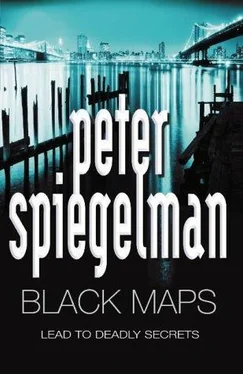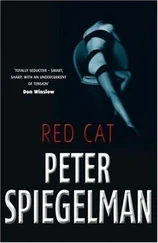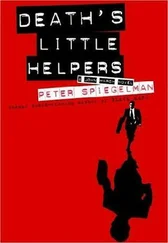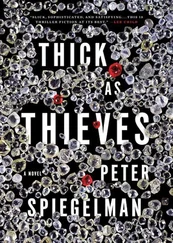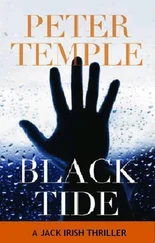Peter Spiegelman - Black Maps
Здесь есть возможность читать онлайн «Peter Spiegelman - Black Maps» весь текст электронной книги совершенно бесплатно (целиком полную версию без сокращений). В некоторых случаях можно слушать аудио, скачать через торрент в формате fb2 и присутствует краткое содержание. Жанр: Криминальный детектив, на английском языке. Описание произведения, (предисловие) а так же отзывы посетителей доступны на портале библиотеки ЛибКат.
- Название:Black Maps
- Автор:
- Жанр:
- Год:неизвестен
- ISBN:нет данных
- Рейтинг книги:4 / 5. Голосов: 1
-
Избранное:Добавить в избранное
- Отзывы:
-
Ваша оценка:
- 80
- 1
- 2
- 3
- 4
- 5
Black Maps: краткое содержание, описание и аннотация
Предлагаем к чтению аннотацию, описание, краткое содержание или предисловие (зависит от того, что написал сам автор книги «Black Maps»). Если вы не нашли необходимую информацию о книге — напишите в комментариях, мы постараемся отыскать её.
Black Maps — читать онлайн бесплатно полную книгу (весь текст) целиком
Ниже представлен текст книги, разбитый по страницам. Система сохранения места последней прочитанной страницы, позволяет с удобством читать онлайн бесплатно книгу «Black Maps», без необходимости каждый раз заново искать на чём Вы остановились. Поставьте закладку, и сможете в любой момент перейти на страницу, на которой закончили чтение.
Интервал:
Закладка:
“Say, for example, that Parsons needs to review all the correspondence that took place between MWB and some particular client. Using the system, they can look at it by date, by subject, by department, by a bunch of other criteria-all online. Or say we get a request for documents, maybe from the U.S. attorneys. We use the system to find what they’ve asked for, and we have the guys in the storage center ship the hard copy. And we also use the system to keep track of who has asked for what items, and to record what we send, and where and when we send it.” She paused again, waiting for questions. This time I had some.
“Do only paper documents go into the database? What about e-mail? Or data from MWB’s accounting systems?”
Compton began nodding before I’d finished my question. “Yep, yep-we use all that stuff. E-mail and any other electronic documents go in the database, the same as paper-only we don’t have to scan them. We use their systems, too-their general ledger, their trading systems, their settlement systems-but that data doesn’t go into the documents database.”
“Is everything that’s supposed to be in there actually on the database at this point?”
“Almost. We’ve got everything from the offices worldwide, but there are some documents from offsite storage that we haven’t gotten to yet. That’s a lot of what you see on the shelves out there.”
“So you’ve got documents going back… how long?”
“Nearly thirty years, to when MWB first opened for business.”
“And people need documents going back that far?”
“Well, not so much the feds. They’re focused on more recent stuff, activity within the statute of limitations-the last seven years or so. But Parsons, for the liquidation work, they go back that far.”
“All the work is done here? All the scanning and abstracting and the rest?”
“Yep. It needs to be controlled centrally. Once stuff is on the system, our teams in the overseas branches can access it. We’re all hooked up to a wide area network.”
“And once something’s in there, how do you find it again? Do you need to know the ID number?” Compton grimaced a little at this.
“No. If you knew the number, you could get at it that way, sure, but nobody knows the numbers. Remember I said that part of what we do is classify? We use those classifications to find documents on the database. Every document gets labeled with information about its subject, its date, the person who authored it, and what department they were in, who it was sent to, who got copied on it, its source-meaning where we found it. And a bunch of other tags as well. We can search on any or all of those fields.” Neary cleared his throat.
“Can you give him a demo, Cheryl?” he asked. Compton’s jaw tightened again, and she glanced at her watch.
“I was going to turn him over to Mitch and Bobby for that, if it’s okay,” she said. Neary looked mildly surprised, but nodded.
“No problem,” he said. “They’re in their office?” She nodded. Neary and I got up, and I thanked Compton for her time. She gave me a quick, distracted handshake, and started clearing papers from her desk.
I followed Neary back down the main corridor, to an adjacent corner of the floor. We walked into another office, about the size of Compton’s and nearly as bare, but outfitted with two desks. Two men were sitting at them.
“Mitch, Bobby, sorry to wake you. Cheryl nominated you guys to give a quick demo of the doc system,” Neary said. The two men chuckled and stood to shake hands and introduce themselves.
Bobby Coe was a ruddy, balding guy, somewhere in his late twenties. He was about my height, but stockier, with a round, open face, and large blue eyes behind wire-framed glasses. What little hair he had left was strawberry blond and short. He wore khakis and a red plaid shirt with the sleeves rolled up over his beefy, freckled forearms. Neary had said most of his guys were ex-feds, and maybe Coe was, but he looked more like an ex-park ranger.
His office mate, Mitch Vetter, was about the same age as Coe, but shorter, about five foot ten, and not as heavily built. He had dark, wavy hair, worn long in a vain attempt to hide the thinning patch on top. His face was pale and narrow, with thick brows and dark eyes set close around a prominent nose. He had a heavy beard, and his five o’clock shadow was barely lighter than his close-trimmed moustache and goatee. He wore black pants and a dark blue shirt, and he did look like an ex-fed-the kind you’d send to infiltrate a crew of Jersey wiseguys.
“Yeah, Cheryl told us,” Vetter said. His voice was surprisingly high, and he had a heavy New York accent. “Step this way.” Vetter sat down and spun his computer screen toward us. Neary and I pulled up chairs, and Coe came around and perched on the edge of the desk. Vetter had a browser running in a window on his screen.
“Cheryl gave us the basics, so you can cut to the chase, Mitch,” Neary said. Vetter nodded.
“Cool. This is the search engine for our document database, and this is the main query screen,” he explained. “With this you can filter through the whole database to find, for example, all the documents that were generated by the loan department on July 23,1994."
His fingers flew over the keyboard as he spoke. He entered search criteria into several labeled fields that appeared on the screen. I could decipher the meanings of some of them, like “document date” and “author,” but others, like “req loc ref,” were gibberish to me.
“This isn’t running on the Internet, is it?” I asked.
“No way,” Coe answered, looking aghast. “It’s running on an intranet we’ve set up. That’s like a private Internet.” Vetter clicked a button labeled “Search,” and almost instantly the results appeared in the form of a list.
“See,” Vetter pointed at the screen. “We got 124 items in all. We show the first twenty on this list. We can pick one and read the abstract.” He highlighted an item and clicked another button. A new window opened, displaying a couple of paragraphs of text. “Or, we can see the original.” He clicked another button and another window opened, this one containing the image of a document on MWB letterhead. It looked like a letter to a client.
“And if we want, we can then go and find any other documents that reference this same client,” Coe said. Vetter demonstrated. The engine came back with 568 items, the first twenty of which were displayed on the screen.
“And if you need to find everything written by a particular person?” I asked.
“No problem,” Vetter said, and he showed me.
“And for all of the items in the database, you keep track of where each one was found?” I asked.
“Yep,” Coe answered. We were all quiet for a while.
“And you also use the system to keep track of who has requested which documents?” I asked.
“Oh, yeah. Everything gets logged-including who made a request, the date they made it, what they asked for, what we sent them in return, and when we sent it,” Coe said.
“What about searches like the ones you just ran?”
“Online queries? Those get logged too-‘everything’ means everything,” Coe said.
“Can you search for documents based on who has accessed them?” Vetter and Coe looked at each other for a while. Finally, Coe spoke.
“If you mean finding every document that, for example, Special Agent John Doe has requested-sure, that’s easy. Like I said, if someone asks us to send something, we record who, what, where, and when on the system, and we can query on those things. If you mean finding everything that, say, I’ve accessed online, that’s doable too, but not as easy. And not everybody could do it. It would mean searching through the log files, and this search engine doesn’t look in those.”
Читать дальшеИнтервал:
Закладка:
Похожие книги на «Black Maps»
Представляем Вашему вниманию похожие книги на «Black Maps» списком для выбора. Мы отобрали схожую по названию и смыслу литературу в надежде предоставить читателям больше вариантов отыскать новые, интересные, ещё непрочитанные произведения.
Обсуждение, отзывы о книге «Black Maps» и просто собственные мнения читателей. Оставьте ваши комментарии, напишите, что Вы думаете о произведении, его смысле или главных героях. Укажите что конкретно понравилось, а что нет, и почему Вы так считаете.
